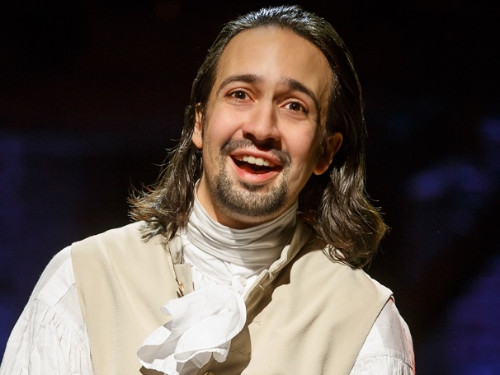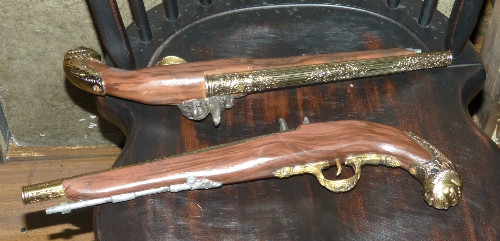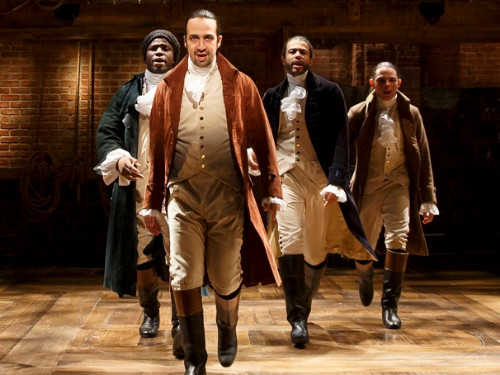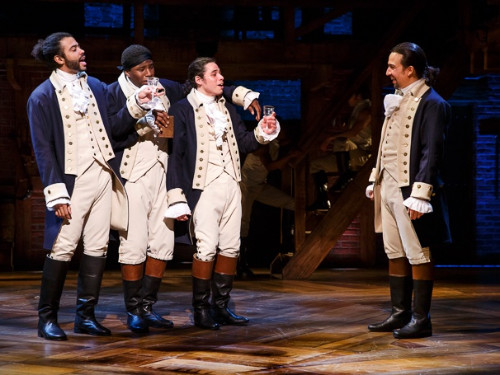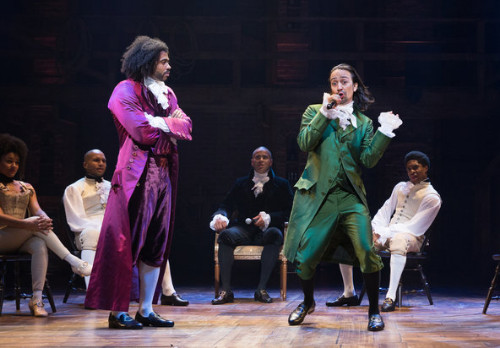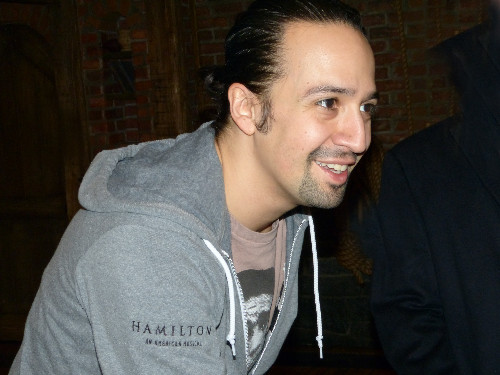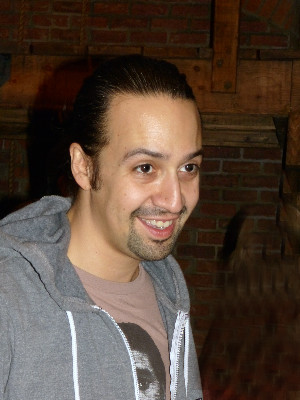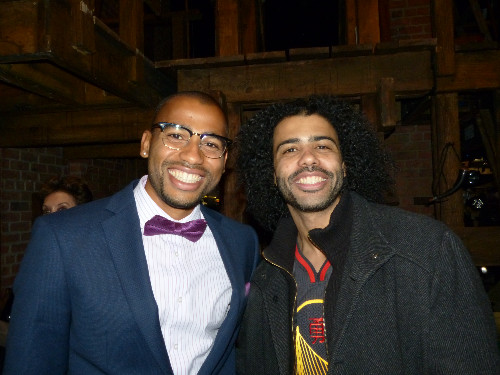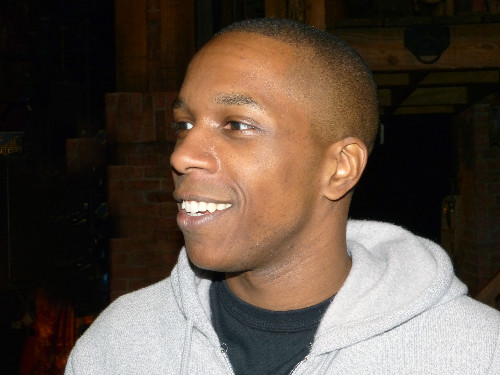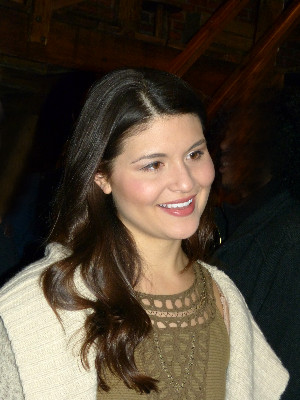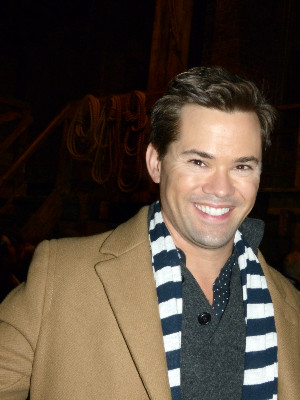Hamilton Hip-Hops on Broadway
Game Changing Musical by Lin-Manuel Miranda
By: Charles Giuliano - Nov 22, 2015
Hamilton
Written by Lin-Manuel Miranda; Inspired By the Book "Alexander Hamilton" by Ron Chernow; Choreography by Andy Blankenbuehler; Directed by Thomas Kail
Cast Lin-Manuel Miranda as Alexander Hamilton, Javier Munoz as Alexander Hamilton (at certain performances), Daveed Diggs as Marquis De Lafayette/Thomas Jefferson, Renee Elise Goldsberry as Angelica Schuyler, Christopher Jackson as George Washington, Andrew Rannels as King George (thru 11/29), Anthony Ramos as John Laurens/Philip Hamilton, Leslie Odom Jr. as Aaron Burr and Phillipa Soo as Eliza Hamilton; Also Jasmine Cephas Jones and Okieriete Onaodowan
With the genius of Lin-Manuel Miranda yet again the vernacular music of the streets, hip-hop and rap, have evolved to high art in the sensational, smash hit Broadway opera “Hamilton” based on the extensive biography by Ron Chernow.
For just under three hours in two acts, with elaborate exposition, the music and choreography pulses relentlessly forward with a rainbow cast telling the galvanic story of the most brilliant of the founding fathers.
Jazz, rock and blues evolved from the brothels of New Orleans, the back porches of Mississippi to the world’s concert halls. This popular music which has evolved into high art, exemplified by Miranda’s masterpiece, represents America’s greatest indigenous art form.
As early as 1911, Scott Joplin, a pioneer of ragtime piano composed an ambitious opera “Treemonisha.” One can connect the dots from Joplin, to the symphonic forms of Duke Ellington, the ambitious works of the post-bop era including suites by Charles Mingus or the collaborations of arranger/ composer Gil Evans and Miles Davis, to the current standard bearer Miranda.
There is a revolution on stage at the Richard Rodgers Theatre where the show is likely to run for years. Audiences are thrilled while critics stumble and fumble to grasp the immensity of a Broadway musical which is catapulting the art form at warp speed into the future.
More than just another Broadway musical Hamilton is truly a transformative artistic experience.
Through my colleague Jack Lyons we managed to purchase virtually impossible to find “House Seats.” We went back stage and interviewed Leslie Odom who plays Burr. There will be a report on that separately.
The show is sold out for the coming year. It is so dense with detail, titubating and energetic that I hope to see the show again and again. There is too much to absorb from a single encounter.
My interest in Alexander Hamilton started long before seeing the Broadway musical. Through my family I inherited a 19th century illustration of the duel in Weehawken, New Jersey, July, 1804. In an interview Miranda described visiting the site which for the most part has been obliterated and forgotten.
Several years ago I read Chernow’s richly detailed and fascinating biography. To his credit Miranda has attempted to be faithful to the facts while crafting a work that tells the story but provides compelling theatre.
His great rival Aaron Burr presents a scurrilous thumbnail of Hamilton. Born on the tiny island of Nevis in 1755, and raised on Saint Croix, he asks “How does a bastard, orphan, son of a whore and a Scotsman, dropped in the middle of a forgotten spot in the Caribbean by providence, impoverished, in squalor, grow up to be a hero and a scholar?”
It has long been speculated, and Chernow confirms, that Hamilton may have been an octoroon. Hence Miranda’s multi racial casting makes perfect sense.
As is always the case when a great book is adapted there are lapses. This is particularly true in the relationship between the handsome and philandering Hamilton and the primary women in his life. As an ambitious graduate of King’s College (later Columbia University) he married well to Eliza (Phillipa Soo) of the wealthy, Albany based, politically connected Schuyler family. He may have been more attracted to her sister Angelica (Renee Elise Goldsberry) who married and moved to England.
Working in New York City with his wife raising their children in Albany, including difficult pregnancies, Hamilton was lured into an affair with a woman in distress. With reckless indiscretion he exchanged love letters with Maria Reynolds (Jasmine Cephas Jones). He was blackmailed by her husband but was unable or unwilling to end the affair. There was a failed attempt to keep it out of the media. The lurid reporting and gossip ruined his political career causing him to return to practicing law.
If his romantic life was somewhat of a mess, and not well explicated in the musical, Miranda has focused forcefully on the intrigues, head butting and charismatic players of the American Revolution and daunting challenges of founding a young nation.
In many ways Hamilton was the brains behind the Revolution, as Washington’s aide de camp, and then first secretary of the treasury in his cabinet. He wrote most of the Federalist Papers and founded a national bank to deal with the staggering debt that was the legacy of the war. In the dirty dealing of this fragile era there was rampant graft and speculation which implicated Hamilton in schemes of insider trading. According to Chernow this entailed violation of trust through information provided to associates.
As the founder of the Federalist party he advocated a strong central government, tariffs and regulation of commerce and trade. He understood the importance of reconciliation with Great Britain. A native of New York, and not reliant on slave labor, he was bitterly opposed by the wealthy Virginians led by Jefferson and Monroe. Jefferson was loyal to France while Hamilton responded that America's alliance was with the deposed monarchy and not with the Directory then in charge during the Reign of Terror. This was exacerbated by the Citizen Genet affair of 1793 when the French ambassador attempted to recruit troops to fight the British.
This was left out by Miranda so we don't grasp the true depth and dimension of the conflict between Hamilton and Jefferson.
A measure of the power and influence of a statesman and politician entails the number and quality of his enemies. When Washington like Cincinnatus traded sword for plow Hamilton was left unprotected.
Miranda dismisses the presidency of John Adams with a rapped one liner. This is a compression of both a great politician and patriot as well as a significant chapter in the evolution of Hamilton then foundering in debt and scandal. Perhaps Miranda might have read the biography of Adams by David McCullough which is ever bit as compelling and insightful as Chernow’s study of Hamilton.
In recent histories Thomas Jefferson has sunken ever lower in our esteem. He was indeed a brilliant man of the Enlightenment but deeply flawed as a human being and statesman.
He is wonderfully portrayed by Daveed Diggs as a flamboyant Francophile. As a diplomat in Paris during the war he didn’t dodge bullets. Diggs has stunning fly moves including adept back-steps which are just short of Michael Jackson’s Moonwalking. The costume of Jefferson, who doubles as the Marquis de Lafayette, is elaborately more fay, dandyish and more colorful than the somber outfits of the other founding fathers.
One of the best scenes in the musical entails a cabinet meeting standoff between Hamilton and Jefferson. In a rap exchange Hamilton cuts his foe a new one.
From Chernow we learn that the gossip and slander of the era was over the top. The attacks of Jefferson and his cronies were particularly vicious.
And yet, in a very close election, the then mostly retired Hamilton supported Jefferson over Aaron Burr (Leslie Odom). This shift surprised Jefferson but shocked Burr. It was yet another step on that inevitable and fateful collision course that ended in a duel. Hamilton disagreed with Jefferson but recognized that he had moral integrity that the ever opportunistic Burr lacked.
One many levels, as conveyed in this production, Burr and Hamilton were equally brilliant and ambitious men. They were both lawyers with mutual respect as colleagues. Miranda has them circling each other including an initial meeting and tavern scene in which Burr gives Hamilton some useful advice "Smile more and talk less."
Under the election rules of the era Burr, who was defeated in a landslide, as the second candidate became the vice president. Jefferson, however, made it clear that the office came with no authority. Burr was later prosecuted and found not guilty in a scheme for the secession of a group of Southern states. Out of that trial came the novel of “The Man Without a Country” which Edward Everett Hale first published in The Atlantic in December, 1863.
It has been written that Miranda debated playing Burr or Hamilton. Indeed the roles are well matched and have the weight of Othello vs. Iago. When awards season rolls around it is inevitable that both Miranda and Odom will be nominated for their performances.
While Burr was an officer in the field he was snubbed by Washington (Christopher Jackson) and his advisers. Burr broods that “No one really knows how / The game is played, / The art of the trade, / How the sausage gets made.”
There is too facile comedy when George III (Andrew Rannells) steps out with crown and flowing ermine robe as a blithering idiot singing “You’ll Be Back” with the lyrics “When push / Comes to shove / I will send a fully armed battalion / To remind you of my love.”
He was not a fool or caricature of power. The king was intelligent and creative though suffering ill health and mental illness in later years. He was the founder of the Royal Academy of the Arts and Science with Sir Joshua Reynolds as its first president. The American artist Benjamin West, a personal friend of the king, was its second.
In addition to the leading actors the entire company represents a powerful and talented ensemble. They are in perpetual movement with numerous costume changes to convey the range of scenes.
The most enduring legacy of this breakthrough production will be its brilliant music. Particularly memorable were “My Shot” “Ten Duel Commandments” Burr’s soliloquy “The Room Where It Happens” “One Last Time” and “It’s Quiet Downtown.”
The scenic design by Paul Tazwell is simple and effective. There is the rustic look of a modular set which evokes tavern, barn, with the rigging of a tall ship. Much is made of the device of a turntable. At times the actors are racing forward in place as though on a treadmill.
In the dueling scene director Thomas Kail has them circling each other. It has been speculated that Hamilton fired into the air. We had previously seen him loose a son to a duel.
The final scene focuses on Hamilton’s wife Eliza. Having lost both her husband at nearly 50 and a son she survived for decades. In the end it is always the women who are the ultimately losers in the deadly games men play.
Hamilton may have had a death wish “I imagine death so much it feels more like a memory / When is it gonna get me? / In my sleep? / Seven feet ahead of me? / If I see it coming do I run or do I let it be?”
Miranda’s Hamilton raps “Hey, yo, I’m just like my country, I’m young, scrappy and hungry, and I am not throwing away my shot.”
In the end it seems he did just that.

